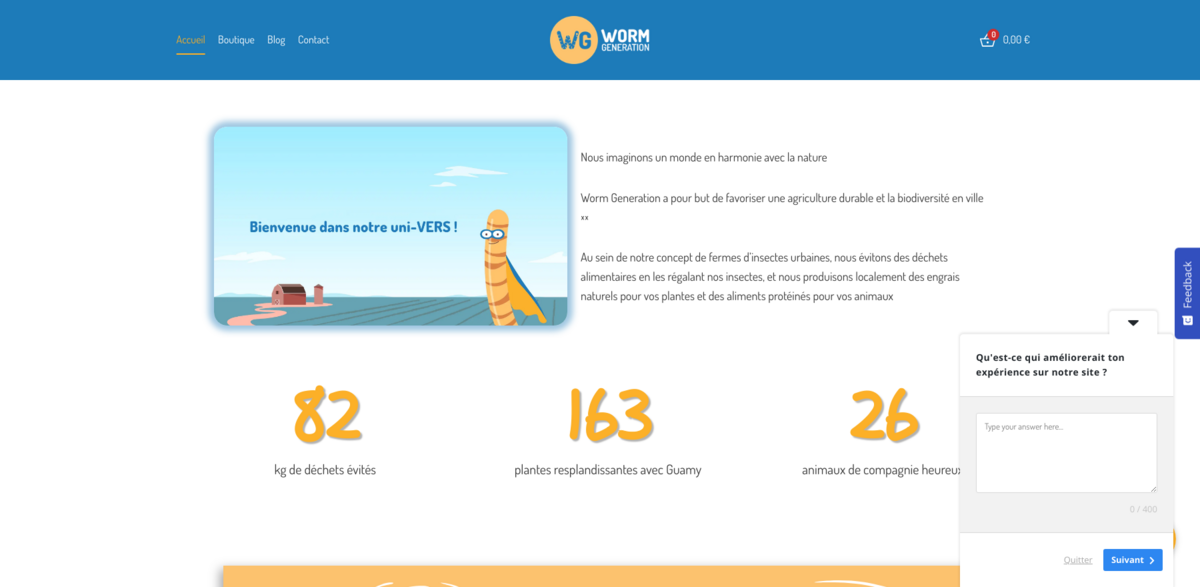What is Worm Generation?
Worm Generation imagines a world in harmony with nature 🌱. The project’s vision is clear: promoting sustainable agriculture and biodiversity right in the heart of the city 🧑🌾. At its core, Worm Generation develops innovative urban insect farms where food waste is cleverly avoided by feeding insects with valuable resources. The concept is simple yet groundbreaking – taking care of insects, who in turn take care of the planet. There’s a natural flow in how these initiatives promise a cleaner, greener urban future… all while inspiring a healthier coexistence between man and nature.
Main Benefits of the Project
Key figures and facts about the project highlight its unique benefits:
- Dried mealworms: These are marketed as a healthy and sustainable solution to feed new pets, offering a nutrient-rich source in a convenient and easy format. Their price range spans from €4.90 to €22.90.
- Guamy (insect guano – natural fertilizer): Serving as a natural fertilizer, it is rich in essential nutrients that promote growth, health, and productivity of plants in an ecological manner. The price range for this product is between €3.90 to €5.99.
- The innovative mealworm farm is designed to biodegrade tons of polystyrene each year, turning waste into a resource.
- The mealworms not only break down harmful polystyrene but also reproduce, regenerating approximately 5% of the initial population with each cycle.
- Frass, the by-product of insect farming, is transformed into natural fertilizer for farmers, adding an extra layer of sustainability.
Innovative Urban Farming
Within the concept of urban insect farms lies a win–win approach: food waste is minimized as insects are fed with discarded materials, and at the same time, natural fertilizers for plants are produced locally. This system fosters a dynamic ecosystem where sustainability is achieved by reducing waste and enhancing the quality of urban greenery. The idea might feel a bit unconventional at first, but it brings a refreshing twist to conventional urban agriculture that many find both exciting and necessary for the future.
Sustainable Collaboration and Waste Reduction
An equally significant aspect is the collaboration with waste companies that collect polystyrene. The collected material is not disposed of in the usual manner; instead, it forms the essential feedstock for the mealworms. These fantastic worms are capable of biodegrading the polystyrene, which not only cleans up waste but also transforms it into valuable protein-rich food for animals. This collaboration turns an environmental liability into a beneficial resource, ensuring that waste management and sustainable food production work hand in hand. The process somewhat mirrors a natural recycling system – a cycle where waste is reborn as a resource for new growth.
Eco-Friendly Production and Responsible Practices
Taking care of insects means taking care of the environment in a very real sense. In the production of dried mealworms, the project ensures that each step in the process is rooted in ecological responsibility. The insects, cherished as tiny ecological allies, play a dual role by biodegrading harmful substances and contributing to the nutritional cycle that supports pets and wildlife. In addition, the insect guano (known as Guamy) enriches the soil organically, ensuring that plants get everything they need to thrive naturally. This approach highlights the importance of responsible practices and eco-friendly production methods that could soon become a benchmark for sustainable urban projects.
Innovative Use of Insect By-Products
One exciting by-product of the mealworm farm is frass, which is repurposed into natural fertilizer for farmers. As the insects feed on polystyrene and convert it into energy, they also produce waste that is a boon for agriculture. The natural fertilizer resulting from these processes is rich in nutrients essential for plant growth. It’s a remarkable example of circular economy principles in action, where every output finds a valuable input to another system. This seemingly simple process can have far-reaching implications for agricultural practices and urban sustainability, showcasing an innovative use of insect by-products that may transform waste management paradigms.
Project Impact on SDGs
- SDG 2: Zero Hunger – by providing sustainable, protein-rich food alternatives for animals and contributing to local food systems.
- SDG 12: Responsible Consumption and Production – through innovative waste management and urban farming practices.
- SDG 13: Climate Action – by reducing polystyrene in the environment and transforming waste into renewable resources.
- SDG 15: Life on Land – by promoting biodiversity and sustainable agriculture within urban settings.
A Future in Harmony with Nature
The Worm Generation project is a bold testament to how nature-inspired solutions can tackle some of the city’s most pressing environmental challenges. With a dynamic approach that transforms waste into valuable resources, this initiative sets the stage for a future where urban landscapes flourish in harmony with nature. The innovative insect farming project not only emphasizes sustainability and biodiversity but also offers practical, tangible benefits – from nutrient-rich pet food to premium organic fertilizers for plants. By integrating traditional agricultural principles with modern waste management and a dash of innovative thinking, the project continues to spark conversations about how cities can grow in tandem with nature. It is a vivid reminder that sometimes, the smallest creatures can have the most profound impact on our urban ecosystems… and the future looks greener because of it.






















